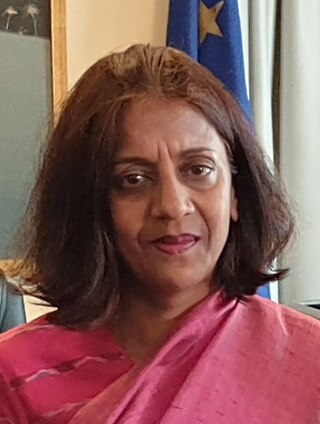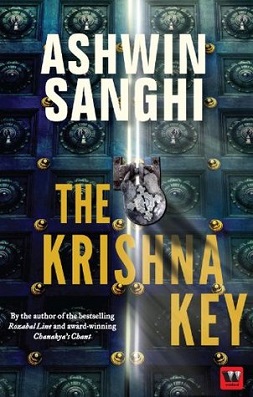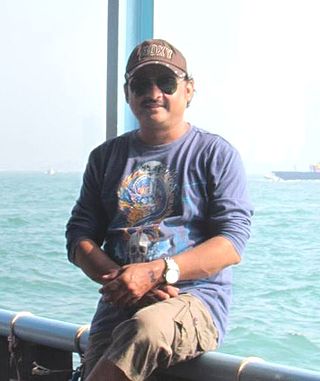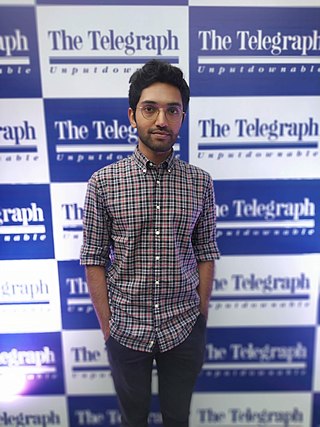
Chandragupta Maurya was Emperor of Magadha from 322 BC to 297 BC and founder of the Maurya dynasty which ruled over a geographically-extensive empire based in Magadha. He reigned from 320 BCE to 298 BCE. The Magadha kingdom expanded to become an empire that reached its peak under the reign of his grandson, Ashoka the Great, from 268 BCE to 231 BCE. The nature of the political formation that existed in Chandragupta's time is not certain. The Mauryan empire was a loose-knit one with large autonomous regions within its limits.

Chanakya was an ancient Indian polymath who was active as a teacher, author, strategist, philosopher, economist, jurist, and politician. He was the first Prime Minister of the Maurya Empire. He is traditionally identified as Kauṭilya or Viṣṇugupta, who authored the ancient Indian political treatise, the Arthashastra, a text dated to roughly between the fourth century BCE and the third century CE. As such, he is considered the pioneer of the field of political science and economics in India, and his work is thought of as an important precursor to classical economics. His works were lost near the end of the Gupta Empire in the sixth century CE and not rediscovered until the early 20th century. Around 321 BCE, Chanakya assisted the first Mauryan emperor Chandragupta in his rise to power and is widely credited for having played an important role in the establishment of the Maurya Empire. Chanakya served as the chief advisor and Prime Minister of the both emperors Chandragupta Maurya and his son Bindusara.

Shashi Tharoor is an Indian activist, politician, historian, public intellectual, writer, and former diplomat, who has been serving as Member of Parliament for Thiruvananthapuram, Kerala, since 2009. He is the present Chairman of the Standing Committee on Chemicals and Fertilizers. He was formerly an Under-Secretary-General of the United Nations and unsuccessfully ran for the post of Secretary-General in 2006. Founder-Chairman of All India Professionals Congress, he formerly served as Chairman of the Parliamentary Standing Committee on External Affairs and on Informational Technology. He has about two dozen titles to his credit and was awarded by World Economic Forum as "Global Leader of Tomorrow".
South Asian literature refers to the literature that is composed by authors in the Indian subcontinent and its diaspora. It has an extensive history with some of the earliest known pieces of literature. South Asia has many different languages that have been spoken due to its size and how long people have been inhabiting it. This has caused the region to be the most linguistically diverse region in the planet, and as well as having four language families, hundreds of languages and thousands of dialects. Many modern pieces of South Asian literature are written in English for a global audience. Many of the ancient texts of the subcontinent have been lost due to the inability to preserve verbally transmitted literature. South Asia has many significant authors that shaped the postcolonial period and response to the British establishment in the subcontinent. Modern South Asian literature has a deep focus on independence from Britain, mainly expressed in prose, this literature commonly discusses the partition of India and how different South Asian nations, religions, and cultures interact with each other. Countries to which South Asian literature's writers are linked include India, Pakistan, Bangladesh, Sri Lanka and Nepal. Works from Bhutan, Myanmar, Tibet, and the Maldives are sometimes also included.
Indian military fiction refers to fiction about the Military of India or military fiction written by Indians.

Devdutt Pattanaik is a mythologist and writer from Mumbai, India. He writes on mythology, the study of cultural truths revealed through stories, symbols and rituals. He lectures on the relevance of both Indian and Western myths in modern life. His work focuses largely on the areas of religion, mythology, and management. He has authored and illustrated over 50 books, including ABC Of Hinduism, Bahubali : 63 insights into Jainism, and Yoga Mythology: 64 Asanas and Their Stories.

Chandraprakash Dwivedi is an Indian actor, film director and screenwriter, who is best known for directing the 1991 television epic Chanakya in which he also played the title role of the political strategist Chanakya and an inspiration for millions. He has also directed the 1996 television series Mrityunjay which is based on the life of Karna, one of the main characters of the epic Mahabharata, for which he won a Screen Videocon Best Director award. His other major work is the 2003 film Pinjar, a tragic love story set amidst the Hindu-Muslim tensions during the Partition of India, based on Amrita Pritam's novel of the same name. He also wrote and directed Akshay Kumar-starrer Samrat Prithviraj (2022). He was honoured by the Government of India with the Padma Shri, the fourth-highest civilian honour of the country, in 2022.

Shamma Jain is an Indian senior diplomat who served as the Indian ambassador to Greece from June 2017 up to October 2019. She has also served as the ambassador of India to Panama, Costa Rica, Nicaragua, Ivory Coast, Liberia, Sierra Leone and Guinea from 2008 to 2011. Aside from serving as an ambassador, Jain has worked in other diplomatic positions, including as the Deputy Chief of Mission in Rome, political counsellor in the United States, and at the permanent delegation of India to UNESCO in Paris.

Ashwin Sanghi is an Indian writer. His novels include The Rozabal Line, Chanakya's Chant, The Krishna Key, The Sialkot Saga, Keepers Of The Kalachakra, The Vault of Vishnu, and The Magicians of Mazda.

The Rozabal Line is a thriller fiction novel by Ashwin Sanghi written under the pseudonym "Shawn Haigins". It follows the alternate religious history of Jesus having survived the crucifixion and settled down in India. The title refers to the Rozabal shrine in Srinagar in Kashmir, which some have asserted is the tomb of Jesus of Nazareth. The historical basis is derived from several other books on the subject including Jesus Lived in India by Holger Kersten and The Unknown Life of Jesus by Nicolas Notovich.

The Nehru–Gandhi family is an Indian political family that has occupied a prominent place in the politics of India. The involvement of the family has traditionally revolved around the Indian National Congress, as various members have traditionally led the party. Three members of the family—Jawaharlal Nehru, Indira Gandhi and Rajiv Gandhi—have served as the prime minister of India, while several others have been members of parliament (MP).

Sunanda Pushkar was an Indian-born Canadian businesswoman and the wife of former International diplomat serving under the UN and politician Shashi Tharoor. She was a sales director in the Dubai-based TECOM Investments, and a co-owner of the India-based Rendezvous Sports World (RSW), a cricket franchise in the Indian Premier League.
Yagyadutt Sharma was a Hindi novelist, writer and poet.

The Caravan is an Indian English-language, long-form narrative journalism magazine covering politics and culture.
Anurag Anand is an Indian artist, corporate professional, and author, with several bestselling titles in the self-help, general fiction, and historical fiction genres. His corporate experience spans across the pharmaceutical, fast-moving consumer goods, and financial services industries.

The Krishna Key is a 2012 anthropological thriller by Indian author Ashwin Sanghi and is his third novel. The book follows a history professor who has to prove his innocence against a murder charge.

Rommel Rodrigues is an Indian author, film director, screenwriter and producer based out of Mumbai. He has worked in several Indian newspapers, writing on crime, business, politics and current affairs for over two and a half decades and was accredited by the Maharashtra Government for nearly 10 years. He's a columnist and presently the editor of SEZ Times.

Telephone / Telecom Advisory Committees (TAC) is a high level Indian government body made up of members of parliament and other members nominated by the Ministry of Communications and Information Technology to address issues concerning telecommunication in India. Looked upon as a privileged panel, the Telephone Advisory Committees, constituted by the Ministry of Communications and Information Technology (India) of the Government of India to serve as a vital feedback mechanism for improvement of services in the Telecommunications sector by the Department of Telecommunications

Manu S. Pillai is an Indian writer and popular historian. Known for his works on the Travancore monarchy and the history of Princely India, he is most famous for his debut book, The Ivory Throne, which is about Rani Sethu Lakshmi Bhay's reign as the Regent of Travancore.
















